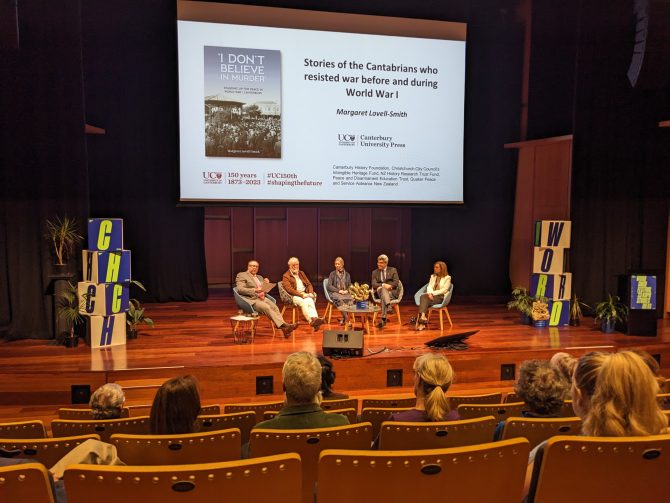Though it was a lovely warm winter lunchtime on Friday, a good crowd came out to hear about the process of writing the upcoming A New History: The University of Canterbury 1873-2023. The editor of the upcoming book Associate Professor Chris Jones led a panel discussion with Dr John Wilson (principal author), local Christchurch history writer Margaret Lovell-Smith, and two contributors to A New History, Professor Cheryl de la Rey, and Pou Whakarae Professor Te Maire Tau.

Chris Jones was a great emcee asking probing questions and making light-hearted observations about his own role as editor. He emphasised the upcoming book seeks to be a “fresh interpretation” and laying out the discussion ahead. I especially liked how he focused on the various kinds of history the upcoming book could have been.
Dr John Wilson made some fascinating comments on the importance of university education, and access to it, as important for the wider community and as a means of mobility. This is not just true now but has been a part of the University’s interaction with the community from the very start. In response to a question about the title, he made the key point of why history is important – that it is both subjective and objective. Each historian will ask different questions and come to the party with their own ideas, concerns, and pre-occupations, but the work they do must be grounded in evidence.
Margaret Lovell-Smith talked about how this had grown out of an earlier project, but she saw a need for a more rounded picture with greater context. Her work looks at conscientious objectors and the peace movement in Canterbury during World War I and how the University had not dealt well with them, which as Chris Jones noted, were both difficult issues to discuss and an important untold story. She also raised some important points for any writer: the need for time and resources and how collaboration with other writers can help (such as different chapters by different writers).
Te Maire Tau talked about his interesting position in writing the opening chapter, and how he didn’t just want it to be about “what went wrong”, and the purposes of the university in producing knowledge and its relevance to the community and the land were not just things that were important for Ngai Tahu, but for the community as a whole. He also put the history of Ngai Tahu and their involvement with the university into some recent context, especially considering the changes since the last 100th anniversary of UC.
Cheryl de la Rey made some interesting comments about how writing the epilogue allowed her to explore the current and future challenges facing the university. But she also showed how these questions showed both continuity and change – that while the specific questions might be new ones, the question of the place and role of the university in the community was not a new one.
Though the session had to wrap up pretty quick due to running out of time, and there was no time for a patented “this is actually more of a comment than a question” Q&A time, it was still a fascinating panel and gave some great insights into the complex process of history writing.
Troy
He Hononga, Tūranga
Find out more
- WORD Christchurch website and 2023 programme
- Follow @WORDChCh on Twitter
- Follow WORDchch on Instagram
- Like WORD Christchurch on Facebook
- Our WORD Christchurch 2023 page



Add a comment to: WORD Christchurch 2023: Turning Points: 150 Years of University of Canterbury History